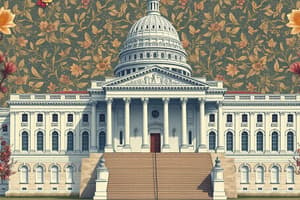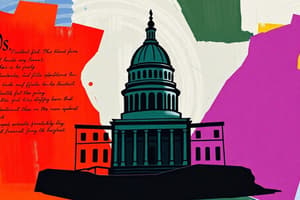Podcast
Questions and Answers
What does Article 1 define?
What does Article 1 define?
- Executive branch powers
- Judicial branch powers
- Legislative branch powers (correct)
- Federal laws hierarchy
What is defined in Article 2?
What is defined in Article 2?
- Executive branch (correct)
- Legislative branch
- State laws
- Judicial branch
What does Article 3 describe?
What does Article 3 describe?
- The process of amending the Constitution
- The powers of the Judicial branch (correct)
- Federal versus state law
- The powers of Congress
What does Article 4 state about states?
What does Article 4 state about states?
What does Article 5 allow?
What does Article 5 allow?
What does Article 6 state about federal laws?
What does Article 6 state about federal laws?
How many states must agree to ratify the Constitution according to Article 7?
How many states must agree to ratify the Constitution according to Article 7?
What are the eligibility requirements for members of the House?
What are the eligibility requirements for members of the House?
What are the eligibility requirements for members of the Senate?
What are the eligibility requirements for members of the Senate?
What are the eligibility requirements for the President?
What are the eligibility requirements for the President?
Identify two express powers of the President.
Identify two express powers of the President.
What are the express powers of the Vice President?
What are the express powers of the Vice President?
Identify two express powers of Congress.
Identify two express powers of Congress.
What power does the executive branch have over the legislative branch?
What power does the executive branch have over the legislative branch?
What power does the executive branch have over the judicial branch?
What power does the executive branch have over the judicial branch?
What power does the legislative branch hold over the executive branch?
What power does the legislative branch hold over the executive branch?
What power does the legislative branch have over the judicial branch?
What power does the legislative branch have over the judicial branch?
What power does the judicial branch have over the executive branch?
What power does the judicial branch have over the executive branch?
What power does the judicial branch have over the legislative branch?
What power does the judicial branch have over the legislative branch?
According to Article 1 of the Constitution, who has the power to declare war?
According to Article 1 of the Constitution, who has the power to declare war?
What power does the Constitution give the President in the area of war?
What power does the Constitution give the President in the area of war?
What bodies have the power to override a presidential veto?
What bodies have the power to override a presidential veto?
What margin is required to override a presidential veto?
What margin is required to override a presidential veto?
Where in the Constitution is the veto power described?
Where in the Constitution is the veto power described?
What body has the power to ratify treaties?
What body has the power to ratify treaties?
What margin is required to ratify treaties?
What margin is required to ratify treaties?
Where in the Constitution is the ratification power described?
Where in the Constitution is the ratification power described?
What body has the power to impeach the president?
What body has the power to impeach the president?
Flashcards
Legislative Branch Power
Legislative Branch Power
Makes laws and controls the law-making process of Congress.
Executive Branch Power
Executive Branch Power
Enforces laws passed by Congress.
Judicial Branch Power
Judicial Branch Power
Interprets laws and applies them to specific cases.
State Autonomy
State Autonomy
Signup and view all the flashcards
Constitutional Amendment Process
Constitutional Amendment Process
Signup and view all the flashcards
Federal Law Supremacy
Federal Law Supremacy
Signup and view all the flashcards
Ratification of Constitution
Ratification of Constitution
Signup and view all the flashcards
House of Representatives - Eligibility
House of Representatives - Eligibility
Signup and view all the flashcards
Senate - Eligibility
Senate - Eligibility
Signup and view all the flashcards
President - Eligibility
President - Eligibility
Signup and view all the flashcards
Presidential Treaty Power
Presidential Treaty Power
Signup and view all the flashcards
Presidential Recess Appointments
Presidential Recess Appointments
Signup and view all the flashcards
Congressional Borrowing Power
Congressional Borrowing Power
Signup and view all the flashcards
War Declaration Power
War Declaration Power
Signup and view all the flashcards
Vice Presidential Power
Vice Presidential Power
Signup and view all the flashcards
Executive Veto
Executive Veto
Signup and view all the flashcards
Impeachment
Impeachment
Signup and view all the flashcards
Judicial Review
Judicial Review
Signup and view all the flashcards
War Powers - Commander-in-Chief
War Powers - Commander-in-Chief
Signup and view all the flashcards
Veto Override
Veto Override
Signup and view all the flashcards
Senate Treaty Ratification
Senate Treaty Ratification
Signup and view all the flashcards
Veto Power Clause
Veto Power Clause
Signup and view all the flashcards
Impeachment Process
Impeachment Process
Signup and view all the flashcards
Judicial Review of Laws
Judicial Review of Laws
Signup and view all the flashcards
Study Notes
Constitution Overview
- Article 1 establishes the Legislative branch's powers and the law-making process of Congress.
- Article 2 defines the Executive branch and outlines how its members enforce laws created by Congress.
- Article 3 establishes the Judicial branch's powers, detailing the Supreme Court's role in interpreting the Constitution and applying state laws.
- Article 4 emphasizes the autonomy of states in creating their laws while requiring respect for laws from other states.
- Article 5 allows for amendments to the Constitution, contingent on a majority vote in Congress.
- Article 6 affirms that federal laws take precedence over state laws; all laws must align with the Constitution.
- Article 7 specifies that ratification requires agreement from nine out of thirteen states.
Eligibility Requirements
- House of Representatives: Must be at least 25 years old, a citizen for 7 years, and an inhabitant of the state they represent.
- Senate: Must be at least 30 years old, a citizen for 9 years, and an inhabitant of the state they represent.
- President: Must be at least 35 years old, a resident for 14 years, and a natural-born citizen.
Powers of Government Branches
-
President's Express Powers:
- Ability to make treaties (with Senate consent).
- Fill Senate vacancies during recess.
-
Vice President's Express Powers:
- Votes in the Senate to break ties.
- Presides over the Senate.
- Assumes presidential powers when necessary.
-
Congress' Express Powers:
- Authorizes borrowing money on behalf of the United States.
- Holds the authority to declare war.
Checks and Balances
- The executive branch holds veto power over legislative bills.
- The President appoints Supreme Court and federal judges, exercising control over the judicial branch.
- The Legislative branch can initiate impeachment proceedings against the executive branch.
- Congress can remove judges through impeachment, exercising oversight over the judicial branch.
- The Judicial branch can declare executive actions unconstitutional.
- The Judicial branch also has the authority to rule legislative acts as unconstitutional.
War Powers
- Congress holds the power to declare war.
- The President serves as Commander-in-Chief of the military.
Legislative Processes
- Override of presidential vetoes requires a 2/3 majority in both the House and Senate.
- Veto power is detailed in Article 1, Section 7 of the Constitution.
- The Senate has the power to ratify treaties, requiring a 2/3 margin for approval as specified in Article 2, Section 2.
- Impeachment power over the President resides with the House of Representatives, while the Senate conducts the trial.
Studying That Suits You
Use AI to generate personalized quizzes and flashcards to suit your learning preferences.




